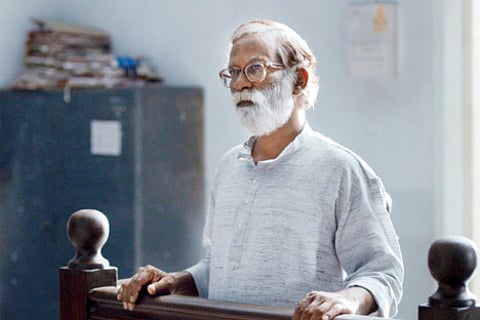Bollywood stars cheer on ‘Court’, India’s Oscar entry
Despite jury drama, Indian film fraternity is unanimous about the choice of Chaitanya Tamhane’s film

Bollywood is on its feet lustily cheering Court, India’s Oscar entry in the foreign-language film category, undeterred by the resignation drama of a jury member that threatened to engulf the selection but is mercifully petering out.
Rahul Rawail, filmmaker and jury member, on Wednesday branded Amol Palekar, who headed the 17-strong jury, “corrupt”, “manipulative” and “obnoxious” before resigning. But even Rawail didn’t question debutante Chaitanya Tamhane’s Court’s credentials to represent India in the Best Foreign Language film category of the 88th Academy Awards, which will be held on February 29, 2016, in Los Angeles.
Applauding Court, Karan Johar called the Marathi movie about India’s judicial dysfunction “the best film of the year”, adding “its [Court’s] selection is undeniably a great decision; am keeping my fingers crossed for its victorious journey ahead”.
Director Hansal Mehta is equally ecstatic. “I’m so pleased to know that the Film Federation of India [tasked by the Information and Broadcasting Ministry to invite nominations and pick India’s Oscar entry] has chosen Court. And for once they’ve chosen well”, he tweeted.
Complimenting Court, another filmmaker, Neeraj Ghaywan, whose Masaan was also in the fray, wrote that the “FFI is finally sending the right film to the Oscars”
Lyricist Varun Grover, actor Ranvir Shorey and actresses Tillotama Shome and Usha Jadhav, said that Court is “India’s best shot at the shortlist in years” and hoped that Tamhane marshals the “marketing resources” to take the fight to the finish.
Tamhane, who is only 28 and is attending a film festival in Japan, tweeted: “At every juncture of the film’s journey, we have felt that it has given us more than we could ever imagine.”
“Once again, the film’s selection to represent India at the Oscars, has come as a genuine surprise. Ever since we started making the film, we kept our expectations low. Especially in this case, since the results tend to be so unpredictable. It just felt like a wise thing to not expect too much.”
Stage actress Geetanjali Kulkarni, who portrayed the public prosecutor in Court, said that representing India at the Oscars is a huge honour. “Honestly, it’s an incredible and unbelievable achievement. We wanted the film to succeed. So all of us are very happy. I would think that the Oscar jury took into account the National Award.”
As well as Kulkarni, the cast includes Vivek Gombher, Pradeep Joshi, Usha Bane and Subodh Kushte. It has been shot by Mrinal Desai and edited by Rikhav Desai, The music is by Sambhaji Bhagat.
The film revolves around the arrest and trial of a Lok Sahir, or balladeer, who is charged with abetting the suicide of a municipal worker through his fiery songs. The art house movie — already a favourite of the festival circuit — closely examines the Indian judicial system from the perspectives of the accused, the defence lawyer, public prosecutor and the magistrate who sits in judgement.
Supran Sen, FFI director-general told tabloid! that the “disagreement” between Palekar and Rawail, who left in a huff even as Court was declared India’s official entry, “was of a personal nature and had nothing to do with the quality of films watched by the jury”.
“Probably Rawail didn’t like something or the other. And he reacted by walking out,” Sen said trying to cap a controversy that could have turned into a full-blown scandal if Palekar had responded to the serious charges levelled against him.
Some critics believe that Tamhane’s left-wing politics shaped Court, which explores the Kafkaesque world of Indian courtrooms where the poor are regularly denied justice. But Tamhane told an interviewer that his approach is more humanistic than political. “I was more interested in the characters, their personal lives and who they were as people. Once I was exposed to certain realities of the judiciary and Indian society, and as working on the film shaped my own politics, it became hard to ignore it or not include it in the story. That is more a by-product rather than a preoccupation I was obsessed with. I was more interested in the narrative on a humanistic level rather than a political or a social level”, he explained.
Tamhane has amassed a lot of festival silverware with his first feature film but he clearly disapproves of critics claiming to know what goes on in the director’s mind.
“I think it’s very presumptuous of people to claim they understand a filmmaker’s intentions. No one can make that claim — you don’t know what’s happening inside a filmmaker’s soul. At best you can hazard a guess.”
“I can’t argue with someone’s experience. If they felt a certain way, then fair enough. But to claim that is exactly the intention with which I made the film is really ridiculous. Either you don’t understand artistic expression at all or you’re claiming some supernatural knowledge of another person’s inner world,” he said.
— S.N.M. Abdi writes across Gulf News.
Sign up for the Daily Briefing
Get the latest news and updates straight to your inbox



